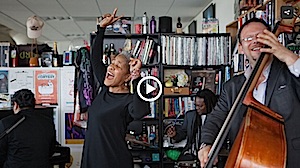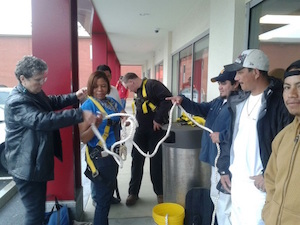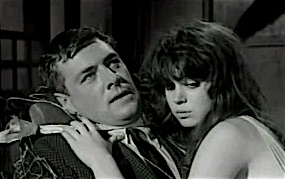Musical Performance: René Marie

Musical Performance: René Marie
August 12, 2016 • “Joined by her Experiment In Truth band, the jazz singer performs songs from Sound Of Red.” (NPR)
Photo: NPR


Musical Performance: René Marie
August 12, 2016 • “Joined by her Experiment In Truth band, the jazz singer performs songs from Sound Of Red.” (NPR)
Photo: NPR

Tonight learn about the Green Party at CNN’s Town Hall, featuring candidates Jill Stein and Ajamu Baraka. The Green Party wants free college tuition, legalized marijuana, massive efforts to reverse climate change, a reduction in U.S. military spending by 15%, and much more.
Watch CNN’s Green Party Town Hall (Youtube.com)

The Black Lives Matter movement attempts to confront the injustices, both legal and extralegal, that black people face in the United States. Many high-profile incidents of police brutality, lethal force, and harassment have been recorded on video camera in recent years, including the killings of Freddie Gray, Michael Brown, Erica Garner, Tamir Rice, and many more.
There is a very real tradition of violence against African-American people, which seems shocking and incomprehensible at first glance, but a study of history reveals the source of the injustice. The brutal institution of slavery has shaped the experience of African-descended peoples in the Americas for centuries. Over hundreds of years people of African descent were kidnapped and sold into slavery, by both Christian and Muslim enterprises, transported under harsh and dangerous conditions to distant shores, and forced to labor to benefit their captors.
The laws and attitudes of the slaver nations, including the United States, adapted to accommodate the unholy institution, which became a new normal, and a new moral low, for societies throughout the New World. Reading and other forms of education were prohibited, draconian punishments and tortures became common place, and codified in the United States Constitution, one of the great political documents of history, African slaves counted as only three-fifths of a whole person. These outrages continued, codified by law, until the Civil War, which ended slavery. But even afterwards, black people continued to endure the legal and social costs of slavery. A system of oppressive laws termed Jim Crow kept black people under the thumb of society, and law enforcement, through the 1960s.
Though the 1964 Civil Rights Act and protests of the civil rights era have improved things for African-Americans, still serious problems and inequities remain. It’s clear, and many studies support this observation, that the police throughout the U.S. treat African-Americans differently. They are much more likely to stop and detain African-Americans for trivial things, and when arrested for serious crimes African-Americans receive harsher sentences. Sadly, at least some cops are much harsher and much quicker to use physical force when dealing with black people, even during relatively harmless situations, like routine traffic stops.
Though there are many good cops who try to do the right thing, the police are at the end of the day people, and like everyone else, they have been formed by society and have absorbed societies mores. Police officers are exposed to the same prejudices and stereotypes growing up, and have the same fears and misconceptions as anyone else. The site of a young black man may trigger feelings of fear that the site of a young white man simply does not. To many white people, including the police, a young white man may seem like a student, while a young black man may seem like possible criminal gang member. To be sure, sometimes young black men, and women, are gang members. But many are students and hold down legitimate jobs.
Unfortunately the fear generated by these stereotypes can lead to tragic consequences when the police feel the need, real or merely perceived, to take action. Many black people, even those who haven’t experienced serious abuse or the use of force, report uncomfortable, unfair encounters with the police, during which they felt disrespected, and devalued. These kinds of interactions are reported with much less frequently by white people dealing with the police. Sadly, the perception of many African-Americans is that the police, including black officers, are there to protect and serve society—-from them.
The tide of wrongful killings, and negative interactions with police must stop, of course. But how? Admitting their is a problem is the first step. Many white people, and conservative law-makers, don’t admit a problem exists, and we all must do so in order to bring about positive change. Next, changes in the way the police are trained, equipped, selected for service, and managed day to day can help.
Body and dash cams are an excellent idea that municipalities and law enforcement organizations should implement widely. These recording devices protect the police from false reports of abuse, and can corroborate the stories of honorable cops doing a good job, while catching questionable actions and incidents of genuine abuse. In addition, offending officers must face justice, to win back the trust and respect of the people they serve.
Do you want to help? Write to your congressman. Get involved in local as well as national political elections. Remain active in your community. Read widely and be aware of what’s happening around the nation and the world. Join organizations that promote social justice.
Photo: By Tony Webster from Minneapolis, Minnesota [CC BY-SA 2.0], via Wikimedia Commons

Musical Performance: The Jayhawks
August 8, 2016 • “The beloved band displays its signature country-tinged rock and close harmonies in four new songs.” (NPR)
Photo: NPR

Musical Performance: Rachel Barton Pine
August 5, 2016 • “Watch the genial violinist commune with nearly 300-year-old music for solo violin by J.S. Bach.” (NPR)
Photo: NPR

Musical Performance: Kevin Morby
August 1, 2016 • “The singer, known for Woods and The Babies, performs carefully crafted songs with powerful lyrics.” (NPR)
Photo: NPR

With the media’s attention turned to Brazil for the 2016 summer olympic games, it’s an excellent time to remember that many people of Brazillian heritage live in the United states, including both recent immigrants and citizens whose families have been in the country for many generations.
Brazillian immigrants first started arriving in the U.S. in 1820, and from 1960 onward there’s been a big surge in immigration. According to the U.S. Census Bureau, in 2012 there were 371,529 Brazillian Americans, who trace their ancestry, by one or both parents, back to Brazillian ancestors. Other sources claim there are between 800,000 and 1.1 million Brazillians living in the U.S.
Brazillians brought their rich cultural heritage to the United States, including the Portuguese language, their cuisine and expressive arts, and many religions, ranging from Roman Catholicism to several animist and spiritualist faiths. They value education, and according to the 2000 U.S. Census, about 34.5% of Brazillians living in the U.S. had completed four or more years of college, which compares quite favorably with 24.4% for the general U.S. population.
New York City, the metropolitan Boston area, and Miami are big centers for Brazillian immigration, and sport the largest Brazillian American communities. Framingham has the largest Brazillian population of any Massachusetts city, followed by Somerville. Other cities with large Brazillian populations include Los Angeles, Atlanta, and Chicago.
There’s a long list of well-known Brazillians and Brazillian Americans who have contributed to U.S. society, including screen legend Carmen Miranda, super model Gisele Bundchen (married to Super Bowl-winning New England Patriots quarterback Tom Brady) and Lin Chao, the biologist and geneticist. People of Brazillian descent have integrated into every walk of life. Many business owners are of Brazillian heritage, and many new Brazillian immigrants start businesses in the United States.
The olympic games is a great time to celebrate the peoples and nations of the world, and to pay particular attention to the people of the host country. Brazillians have contributed to the fabric of American life, for the better part of 200 years, enriching the nation.

So much is made in a Presidential election season, like 2016, about who will win the White House, and govern for the next four to eight years. Proponents of both Trump and Clinton insist their candidates will rescue the country from a precipitous decline, and warn about disastrous consequences should the other candidate win the general election. Democrats are terrified of a Trump Presidency, and urge the democratic base to elect Hillary Clinton, to keep Trump out of the White House. These concerns are understandable, since the President of the United States wields great influence and power, and it’s a very high-profile office.
But we must not forget one important fact: the checks and balances designed into the federal government by the Founding Fathers limit Presidential power, dividing the government into three distinct branches: legislative, judicial, and executive. The President must work effectively with all three, and particularly with the legislative branch, in order to pass the laws necessary to change the country significantly, either for better or worse.
So it’s not enough for Hillary Clinton to win the general election. The democrats must take back congress, with majorities in both the House of Representatives and the Senate, in order to ensure she will have an effective Presidency, and get real work done. This of course holds true for Trump supporters as well, though they currently do hold majority positions in congress, therefore Trump has a chance to be highly effective, for better or worse, should he win in the general election.
We have a clear precedent for this situation. Back before 2010, Nancy Pelosi’s Democratically controlled House worked well with President Obama, ushering in the sweeping changes of the Affordable Care Act (ACA) and changing health care in the U.S. significantly. However, following a series of defeats for democrats in both the House and Senate in multiple elections, they lost the majority in congress. The resulting congress, dominated by very conservative groups like the Tea Party, didn’t work well with President Obama at all. In fact, congress wasn’t even willing to compromise on many middle-ground issues, compromising the President’s effectiveness, and forcing him, in many cases, to govern by Executive Order, if possible.
Sadly, grid lock and extremism now rule in Washington. Even conservative icons like Tom Delay and New Gingrich weren’t as obstructionist as the current leaders in congress. The people must be made aware of this urgent issue. Voting for a candidate, even a highly qualified and impressive candidate, in the general election simply isn’t enough. Winning the congressional elections, the mid-term elections, is just as vital to ensure the success of the next President.
The American people must be made aware of this, via the media, and direct appeals from political candidates. Ordinary progressively-minded citizens who vote for Hillary Clinton must go to the polls and vote for democratic congressional candidates who will actively support Hillary Clinton in Congress, otherwise her Presidency will fail, and she will struggle for effectiveness, even more so than President Obama.

Spider Baby, 1964
“…It stars Lon Chaney, Jr. as Bruno, the chauffeur and caretaker of three orphaned siblings who suffer from “Merrye Syndrome”, which causes them to mentally, socially, and physically regress backwards down the evolutionary ladder starting in early puberty.” (Wikipedia) (Browse our Movie Archive)

Musical Performance: Lucy Dacus
July 29, 2016 • “The Virginia musician writes songs that can be thoughtful, playful and powerful.” (NPR)
Photo: NPR